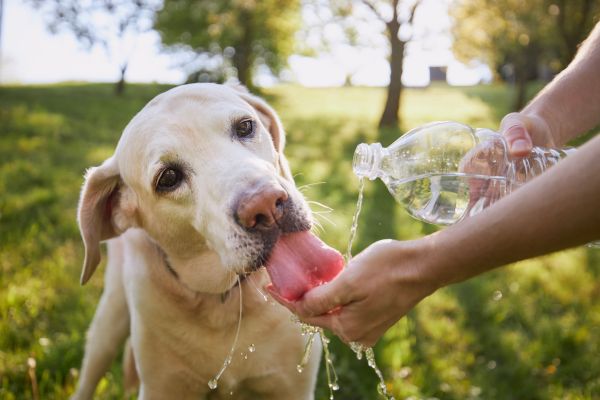
Keeping your pet well-hydrated is essential for their overall health. Just like us, pets need enough water and electrolytes to keep their bodies working properly and stay healthy. Unfortunately, many pets don’t drink enough water, which can cause dehydration and a range of health problems.
Why Hydration Matters for Pets
Water is essential for all living creatures, and pets are no different. Proper hydration helps with crucial bodily functions like digestion, regulating body temperature, and absorbing nutrients. When pets don't get enough water, they can face a variety of health problems. These can range from minor issues like dry skin and tiredness to serious conditions like kidney failure and heatstroke. Making sure your pet stays hydrated is key to keeping them healthy and happy.
Signs of Dehydration in Pets
Recognizing when your pet is dehydrated is vital for maintaining their health and well-being. Dehydration can sneak up on pets, especially since they often don't drink enough water on their own. Being able to identify the early signs of dehydration can help you take prompt action before it leads to serious health issues. Just like humans, pets rely on adequate hydration to support essential bodily functions such as digestion, temperature regulation, and nutrient absorption. When these functions are disrupted due to lack of water, your pet can experience a range of health problems, from mild discomfort to severe conditions. By understanding the signs of dehydration, you can ensure your pet remains healthy and happy.
Here are the key signs of dehydration in pets:
- Dry Nose and Gums: A healthy pet should have a moist nose and gums. Dryness in these areas can be an early warning sign of dehydration.
- Lethargy: Dehydrated pets often appear tired and lack their usual energy. If your pet seems unusually lethargic, it might be due to insufficient hydration.
- Sunken Eyes: Dehydration can cause the eyes to appear sunken. This is a more noticeable sign that your pet needs more water.
- Loss of Skin Elasticity: When gently pinched, a well-hydrated pet’s skin should quickly return to its normal position. If the skin stays up or returns slowly, this indicates dehydration.
- Panting and Rapid Heartbeat: Excessive panting and an unusually fast heartbeat can be serious indicators of dehydration, especially if they occur in cooler temperatures or without exertion.
- Lack of Interest in Eating: Sometimes, dehydrated pets may show less interest in their food. This could be due to an overall feeling of unwellness caused by dehydration.
- Dark Urine: Just like in humans, dark urine in pets can be a sign of dehydration. It indicates that the body is trying to conserve water.
Common Causes of Dehydration
Dehydration in pets is a common issue that can arise from a variety of factors. Understanding what can lead to dehydration is crucial for pet owners, as it allows them to take preventive measures and ensure their pets remain hydrated and healthy. Pets are particularly vulnerable to dehydration due to their reliance on us to provide adequate water and their often limited ability to communicate their needs. Here are some of the key factors that can contribute to dehydration in pets:
- Inadequate Water Intake: Pets may not drink enough water for various reasons, including illness or simply not having easy access to fresh water. Sometimes, pets are picky about their water source, preferring clean, cool water, and may refuse to drink if their water bowl is not regularly refreshed.
- Hot Weather: Higher temperatures significantly increase the risk of dehydration. Pets can easily overheat, especially if they are outside or in a warm environment without adequate shade or water.
- Illness: Certain health conditions, such as kidney disease or diabetes, can increase the likelihood of dehydration. These conditions can cause increased urination or an inability to retain water, leading to fluid loss that needs to be replenished more frequently.
- Physical Activity: Pets that are very active or engage in strenuous exercise need more water to stay hydrated. Just like humans, pets lose fluids through exertion, and without adequate water intake, they can quickly become dehydrated.
Ensuring Your Pet Stays Hydrated
By understanding what can cause dehydration, pet owners can take proactive steps to ensure their pets stay properly hydrated. Making sure your pet has continuous access to fresh, clean water, monitoring their activity levels, and being mindful of environmental conditions are crucial practices. Additionally, during periods of illness or hot weather, increasing water availability and encouraging your pet to drink can help maintain their hydration and overall health.
Here are several effective ways to encourage your pet to drink more water and stay well-hydrated:
- Provide Fresh Water: Always ensure your pet has access to clean, fresh water. Change the water frequently and clean the bowl daily to keep it appealing and safe for your pet to drink.
- Multiple Water Stations: Place water bowls in different locations around your home to make it easier for your pet to find and access water. This is especially helpful for pets that may not venture far from their favorite spots.
- Add Water to Food: Mixing water into your pet’s food, particularly dry kibble, can significantly increase their water intake. This is an easy way to boost hydration, especially for pets who are reluctant to drink water on their own.
- Hydration Supplements: Consider using hydration supplements or electrolyte solutions designed specifically for pets. These can be added to their water or food to ensure they get the necessary minerals and stay properly hydrated.
- Flavor the Water: Adding a small amount of low-sodium broth to your pet's water can make it more appealing and encourage them to drink more. The added flavor can be particularly enticing for picky drinkers.
- Monitor Water Intake: Keep track of how much water your pet drinks daily. This is especially important during hot weather or if your pet is ill. Monitoring their intake can help you identify any changes in their drinking habits that might indicate dehydration or other health issues.
The Role of Electrolyte Supplements in Pet Health
In addition to water, providing your pet with electrolyte supplements can be a key factor in maintaining their fluid balance and overall health. Electrolytes are essential minerals that support critical bodily functions, and supplements can be especially beneficial during times of illness, after intense physical activity, or in hot weather when dehydration risks are higher. These supplements can be added to your pet’s water or food, making it easy to incorporate them into their daily routine. However, it's important to choose products specifically formulated for pets and to consult your veterinarian before starting any new supplement regimen to ensure safety and efficacy.
Understanding Electrolytes
Electrolytes are minerals that play a crucial role in maintaining fluid balance, nerve function, and muscle contractions in your pet’s body. The most common electrolytes include:
- Sodium: Helps regulate water levels and is essential for nerve and muscle function.
- Potassium: Crucial for heart function and muscle contractions, as well as maintaining proper nerve function.
- Calcium: Vital for bone health, muscle contractions, and proper functioning of the nervous system.
- Magnesium: Important for muscle and nerve function, as well as energy production.
An imbalance in these electrolytes can lead to serious health problems, including muscle weakness, heart issues, and neurological disorders. For instance, low sodium levels can cause lethargy and confusion, while high potassium levels can lead to dangerous heart rhythms.
Benefits of Electrolyte Supplements
Electrolyte supplements can offer several benefits for your pet's health:
- Improved Hydration: Electrolytes help retain fluids in the body, ensuring your pet stays properly hydrated.
- Enhanced Recovery: After intense physical activity or illness, electrolyte supplements can help your pet recover more quickly by restoring essential minerals.
- Support During Illness: Pets with certain medical conditions, such as kidney disease or diabetes, may benefit from electrolyte supplementation to manage fluid and mineral balance.
- Temperature Regulation: During hot weather, electrolytes can help your pet maintain proper body temperature and prevent heatstroke.
Choosing the Right Electrolyte Supplement
When selecting an electrolyte supplement for your pet, consider the following:
- Formulation: Ensure the product is specifically designed for pets. Human electrolyte supplements may contain ingredients that are harmful to animals.
- Quality: Look for high-quality products with minimal additives and artificial ingredients.
- Veterinary Approval: Always consult with your veterinarian before starting any new supplement to ensure it is appropriate for your pet’s specific health needs and conditions.
How to Administer Electrolyte Supplements
Electrolyte supplements can be easily added to your pet’s water or food. Here are a few tips:
- Water: Mix the recommended dose into your pet's water bowl, ensuring it is thoroughly dissolved. Monitor to ensure your pet is drinking the water.
- Food: Sprinkle the supplement onto your pet's food, mixing it well to ensure even distribution. This method can be particularly useful for pets who are fussy about drinking water.
By understanding the importance of electrolytes and incorporating high-quality supplements into your pet’s diet, you can help maintain their health, especially during times when they are at greater risk of dehydration. Always prioritize products specifically formulated for pets and seek veterinary advice to ensure the best outcomes for your furry friend..



